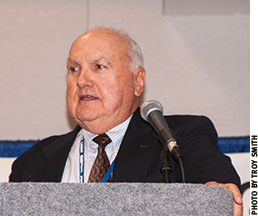Drought Management of
Forage, Water and Cattle
A plan for destocking may be your most important strategy.
by Troy Smith for Angus Journal
TAMPA, Fla. (Feb. 6, 2013) — As a manager of ranches in Wyoming and Nebraska, and more recently as a ranch management consultant, Burke Teichert has experienced more than a few droughts. None lasted forever, but sometimes a ranch must endure several drier-than-normal years. Teichert talked about strategies for drought management during a Cattlemen’s College® session at the 2013 Cattle Industry Convention in Tampa, Fla.

A plan for destocking may be your most important drought strategy, said Burke Teichert.
“Drought seldom means no rain — just less than normal. Sometimes it’s quite a bit less, for a period of several years,” said Teichert. “We have to manage the land so we can take advantage of whatever rain we get.”
Teichert stressed the need for protecting the land by managing the water cycle, mineral cycle, energy flow and biosuccession. An advocate of rotational grazing, he said it’s necessary to rotate cattle in a timely fashion and leave some grass behind in order to grow more. Teichert said leaving litter behind also helps prepare the soil to receive and hold moisture when it does come.Protecting the land during drought often requires destocking by relocating cattle or selling them. Teichert said that for cow-calf producers in particular, it can be emotionally difficult. Even so, he said, every ranch needs to know how and when to reduce numbers of animals.
“Every ranch needs to have a plan for destocking as part of its overall drought plan,” stated Teichert, “and the earlier you begin, the less you will have to destock.”
Teichert said producers should know when precipitation historically falls on their ranch and how much. Based on historical data, they can estimate how much forage will be produced and whether it’s going to be enough.
“You have to establish critical dates for your plan — dates when you’ll have to make the decision to remove cattle. You also need to know which cattle go first, whether it’s stockers, late-calvers or older cows. Start with what hurts the least to sell, but when cattle need to be removed, do it. Be disciplined,” advised Teichert.”
Having well-placed stock water is beneficial during drought, as it encourages better grazing distribution. Teichert noted how the use of pipelines fed by deep well and portable solar pumps for shallow wells can help make a ranch a little more drought-resistant.
“But a plan for destocking may be most important. Put it in writing, and you’ll be more apt to follow the plan,” said Teichert. “If you are going to relocate cattle, know where you’re going to go. If you must sell, know the market for various classes of cattle. Make decisions that are cost-effective. It’s easier to make decisions based on emotion, but they can be costly.”
Now in its 20th year, Cattlemen’s College has established a reputation as one of the most thorough producer education programs in the nation. Coordinated by the National Cattlemen’s Beef Association (NCBA), the educational program is sponsored by Zoetis Animal Health (formerly Pfizer Animal Health).
--------------------
Editor’s Note: The above article was written under contract or by staff of the Angus Journal. It may not be reprinted without express permission of the Angus Journal. To request reprint permission, contact the editor at 816-383-5200.
www.4cattlemen.com is an event coverage site provided by the editorial team at Angus Productions Inc. (API), publisher of the Angus Journal, the Angus Beef Bulletin, the Angus Beef Bulletin EXTRA and the Angus e-List. For questions about this site, to submit an article for our consideration, or to report a broken link, contact the editor at 816-383-5200; 3201 Frederick Ave., Saint Joseph, MO 64506.
API claims copyright to this website as presented. We welcome educational venues and cattlemen to link to this site as a service to their audience.

